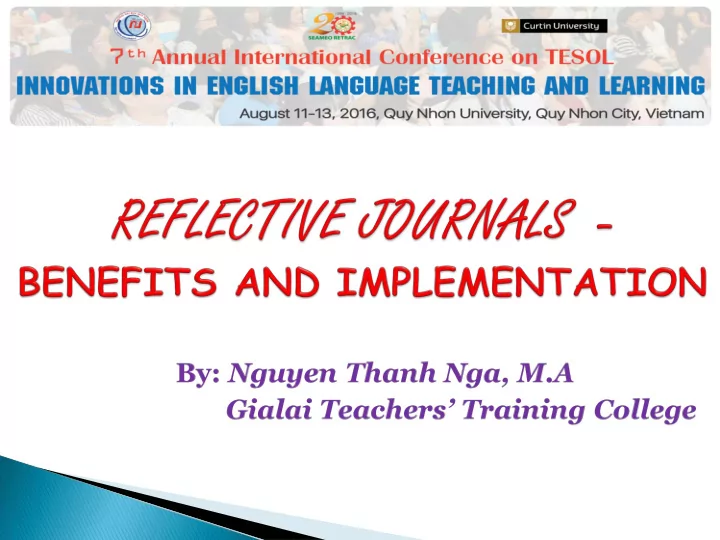

2006: O’Connell and Dyment explored the benefits of journaling in motivating students in the process of reflecting on their own learning and improving their own writing skills. 2011: Farrah examined the benefits of reflective journaling on improving English writing skills, increasing motivation, enhancing creativity and critical thinking among university students
2011: Lear investigated the impact of guided reflective journals on improving certain domains of intonation as well as increasing motivation and developing metacognitive awareness 2014: Meral Çapar conducted a study to investigate the extent to which EFL learners could reflect on their essays in an EFL writing course and whether guidance of the teacher could help them to improve their reflections.
Little research Limited use
THEORETICAL BACKGROUND Richards and Lockhard (1996): “a number of important dimensions of teaching, including teachers’ and learners’ beliefs, teachers’ decision making, and teachers’ and learners’ roles” Farrell (2012): how language teachers can use reflective writing as a mean of reflective practice for professional development purposes
THEORETICAL BACKGROUND Spalding and Wilson (2002): reflective journals create positive student - instructor relationship and offer writers a record of experiences and personal growth Moon (1999) and Evans (2007): reflective learning helps students to gain and develop a deeper style of learning.
THEORETICAL BACKGROUND The characteristics of reflective writing: your response to experiences, opinions, events • or new information your response to thoughts and feelings • a way of thinking to explore your learning • an opportunity to gain self-knowledge •
THEORETICAL BACKGROUND The characteristics of reflective writing: a way to achieve clarity and better • understanding of what you are learning a chance to develop and reinforce writing skills • a way of making meaning out of what you study • (Source: An - Najah Univ. J. Res. (Humanities). Vol. 26(4), 2012)
Theoretical background 1. Write, record The Process of Reflective writing 2. Reflect, think about 3. Analyze, explain, gain insight 5 steps 4 . Conclusions 5. Personal action plan
The participants: 35 English – majored students The course: Integrated skills The Coursebook: New Cutting Edge – Intermediate level (Cunningham S. and Moor P. 2005)
The context of experience Integrated Speaking Skills Previous courses Cross Cultural Teaching Communication Methodology
Statement of problem The students Limited knowledge of Passive methodology Poor writing skills
The procedure Step 1: Write, record Q1: What are the teaching points of the lessons? Q2: What activities were conducted ? Q3: What did you have to do in each activity?
The procedure Step 2: Reflect, think about Q1: What technique did the teacher use to teach the knowledge / skills? Q2: What activity did you like best? Q3: Were there any activities that you didn’t like?
Step 3: Analyze, explain, gain insight Q: Why did / didn’t you like the activity?
Step 4 : Conclusions Q1: Do you understand the lesson in general? Q2: Do you think the teacher achieved her objectives?
Step 5: Personal action plan Q: What are you going to do with this lesson?
Student s journals Q1: What are the teaching points of the lessons? • New words for students: some new words about the technology • Students know information of machines • Students use speaking skill, reading skill, working group
Student’s journals Q1: What are the teaching points of the lessons? • Language: vocabulary about technology • Skills: Reading and speaking skills
Student’s journals
THE QUESTIONNAIRE Options Number Percentage (%) Dimensions Reflective journal writing helped to improve your writing 31 88,6 skills Reflective journal writing helped to consolidate your 13 37,1 knowledge of teaching methodology Improving learning Reflective journal writing helped you memorize the 32 91,4 lessons better You learnt nothing from writing reflective journals 1 2,8 Reflective journal writing helped you talk about your 32 91,4 experiences Reflective journal writing helped to identify what you do 22 62,8 well and what you need to learn more Gaining autonomy Reflective journal writing was an opportunity to gain 26 74,3 self-knowledge You did not understand what you are supposed to write 0 0 in your journals Your reflective journals helped the teacher understand 26 74,3 the progress of her students Your reflective journals gave the teacher ideas in 27 77,1 planning what to teach in her next lesson Value to teaching Your reflective journals helped the teacher teach more 22 62,8 effectively Reflective journal writing helped you develop critical 19 54,2 and learning thinking skills Reflective journal writing is useful for your study 34 97,2 Reflective journal writing is a waste of time 1 2,8 Reflective journal writing should be encouraged / 34 97,2 continued
Reflective journal writing Helps to improve students’ learning Helps students have deeper understanding of their learning progress. Gives students opportunities to gain self- knowledge and prepare themselves for what to learn next Helps the teacher improve her professional and pedagogical knowledge
The use of reflective journal writing should be implemented as an integral part in Integrated Skills and Writing courses. Further studies should be carried out in order to investigate more benefits of reflective journal writing in language teaching.
Recommend
More recommend